22.12.2023
Virgin Galactic to launch 6th commercial spaceflight on Jan. 26
Four people will fly on the mission, but their names haven't been announced yet.
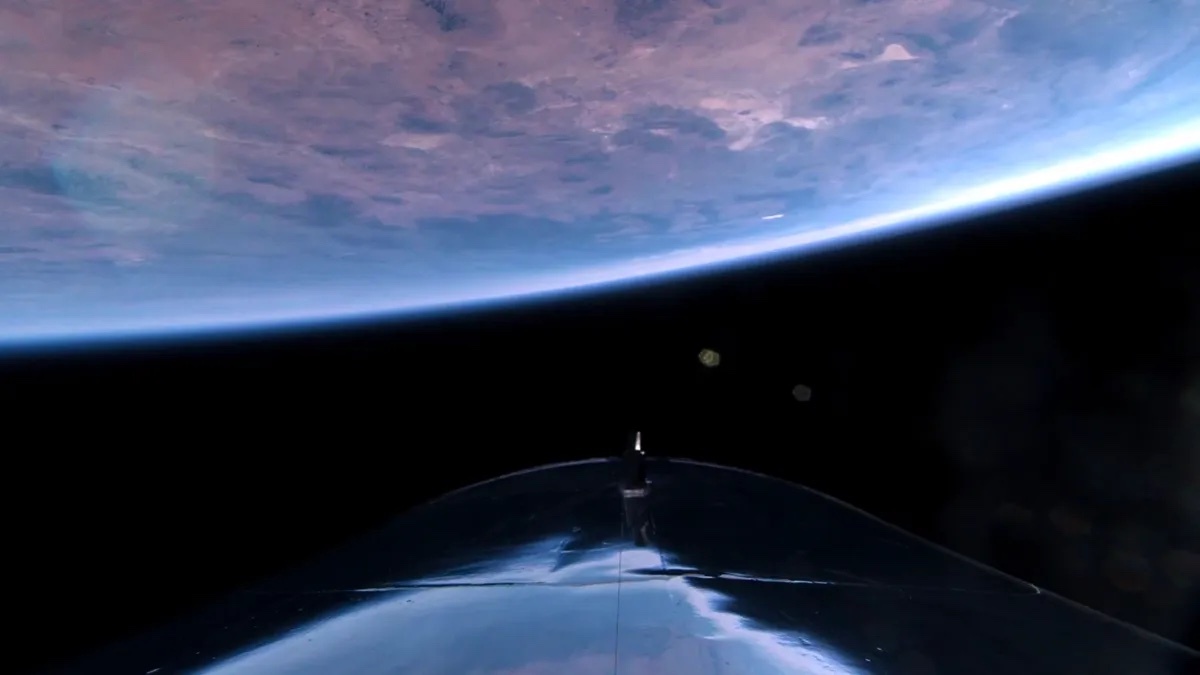
The view from Virgin Galactic's VSS Unity space plane on the Galactic 05 suborbital mission, which launched on Nov. 2, 2023. (Image credit: Virgin Galactic)
Virgin Galactic's sixth commercial spaceflight will lift off next month, if all goes according to plan.
The mission, known as Galactic-06, is targeted for Jan. 26, Virgin Galacticannounced in a statement issued on Tuesday (Dec. 19). The flight will include four private astronauts — one from Texas, one from California, one from Austria and one jointly from Ukraine and California, according to the statement. Names of the participants were not released.
Virgin Galactic, which is part of billionaire Richard Branson's Virgin Group of companies, takes tourists and private astronauts to suborbital space using an air-launched system. That system consists of a carrier aircraft, VMS Eve, that deploys the VSS Unity space plane at an altitude of about 50,000 feet (15,000 meters). On Galactic-06, Unity will be helmed by commander C.J. Sturckow and pilot Nicola Pecile, and Eve will be flown by commander Michael Masucci and pilot Dan Alix.
The company finished six spaceflights in as many months in 2023 following a two-year hiatus for hardware upgrades. Some of those flights catered to private tourists, while others also served governmental customers. For example, Walter Villadei of the Italian Air Force commanded Italy's Virtute-1 mission aboard a June 29 Virgin spaceflight, in part as training for his upcoming trip to the International Space Station on Axiom Space's Ax-3 mission, which is slated to lift off on Jan. 9.
Virgin Galactic is expected to ground its Unity space plane in 2024 after perhaps one or two more flights, company representatives have said. The company wants to focus on developing its next-generation "Delta class" space plane that could fly as often as twice a week once it's ready, CEO Michael Colglazier said in a November earnings call, as reported by SpaceNews.
Test flights of Delta vehicles are expected to begin in 2025, with full operational service commencing in 2026. The Virgin fleet, incidentally, does not fly beyond the Kármán Line of 62 miles (100 kilometers), considered by international authorities to be the boundary of space. But U.S. entities use a different boundary, 50 miles (80 km), that Virgin breaches regularly.
Virgin Galactic's main competitor in the suborbital tourism industry, the Jeff Bezos-backed Blue Origin, had a 15-month gap in flights after a September 2022 failure on an uncrewed mission of its New Shepard spacecraft, which is rated for both payloads and people. Blue Origin returned to flight on Tuesday with an uncrewed New Shepard launch and plans to fly people again soon.
Quelle: SC
----
Update: 24.01.2024
.
Virgin Galactic may launch 6th commercial spaceflight this week
The launch window for the Galactic 06 mission opens on Friday (Jan. 26).
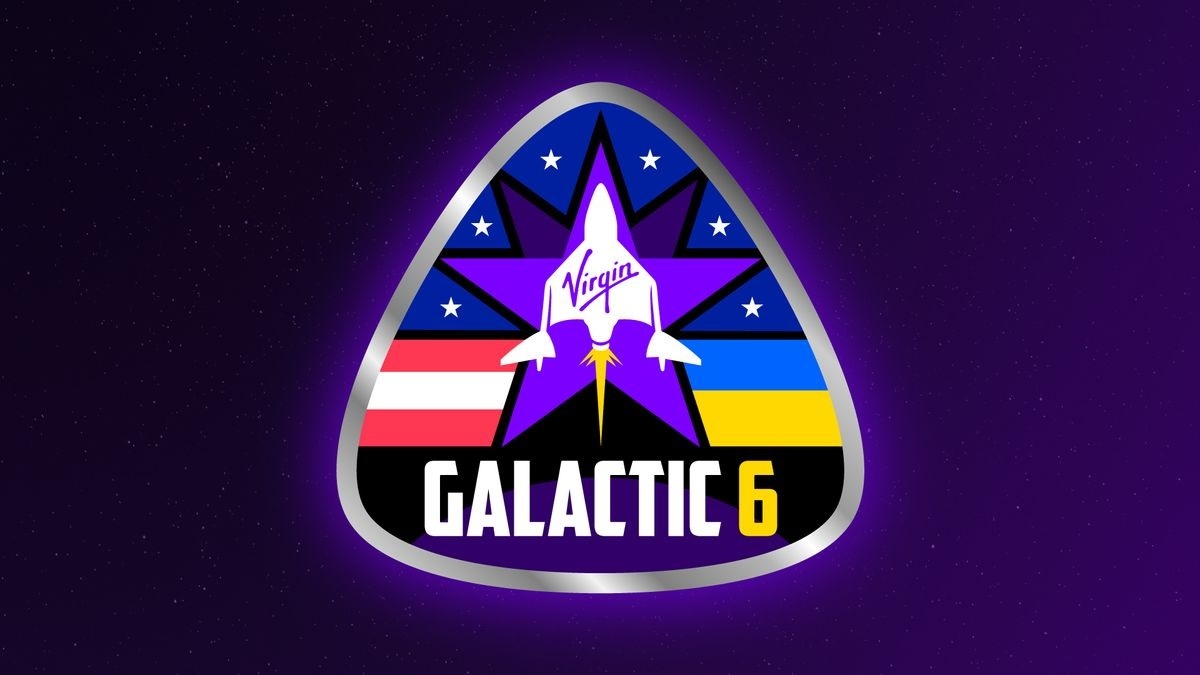
The patch for Virgin Galactic's Galactic 06 mission, which could launch as soon as Jan. 26, 2024. (Image credit: Virgin Galactic)
Virgin Galactic's sixth commercial spaceflight may be just around the corner.
The launch window for the crewed suborbital mission, known as Galactic 06, opens on Jan. 26. And, to help remind us of this fact and build up interest in the flight, Virgin Galactic just released the mission's patch.
"The patch represents the Ukrainian, Austrian and United States nationalities showcasing our crew's global background. One star for each Pilot and Astronaut crew and a central seven-point star denoting mountains and continents conquered by members of the crew," the company wrote in a post on X on Monday (Jan. 22) that showcased the patch.
Four private spaceflyers will make the trip on Galactic 06, Virgin Galactic has said. The company has not yet released their identities. It's also unclear if the mission will be livestreamed; if so, you can watch it here at Space.com, courtesy of the company.
Virgin Galactic employs an air-launch system, which consists of a carrier aircraft called VMS Eve and a space plane named VSS Unity.
Eve lifts off from a runway with Unity beneath its wings and drops the spacecraft at an altitude of about 45,000 feet (13,700 meters). Unity then ignites its onboard rocket motor, powering itself to suborbital space.
Passengers aboard the space plane experience a few minutes of weightlessnessand get to see Earth against the blackness of space before coming back down for a runway landing. Virgin Galactic is currently selling seats aboard the six-passenger vehicle for $400,000 apiece.
Galactic 06 will be one of Unity's final spaceflights, if all goes according to plan; Virgin Galactic intends to ground the vehicle to focus on developing its "Delta class" of space plane.
Each Delta vehicle will be capable of flying up to twice per week, company representatives have said. The first Delta space plane is expected to start test flights next year and begin commercial operations in 2026.
Quelle: SC
----
Update: 27.01.2024
.
Virgin Galactic launches 1st Ukrainian woman to space — and 3 others — on Galactic 06 suborbital flight
Virgin Galactic's sixth commercial spaceflight was a success.
Virgin Galactic just launched its sixth commercial spaceflight.
That mission, called Galactic 06, sent four private passengers to suborbital space and back, among them the first Ukrainian woman ever to reach the final frontier.
"Welcome back to Earth, #Galactic06! Our pilots, crew and spaceship have landed safely at Spaceport America, New Mexico," Virgin Galactic said in a post on X shortly after touchdown today.
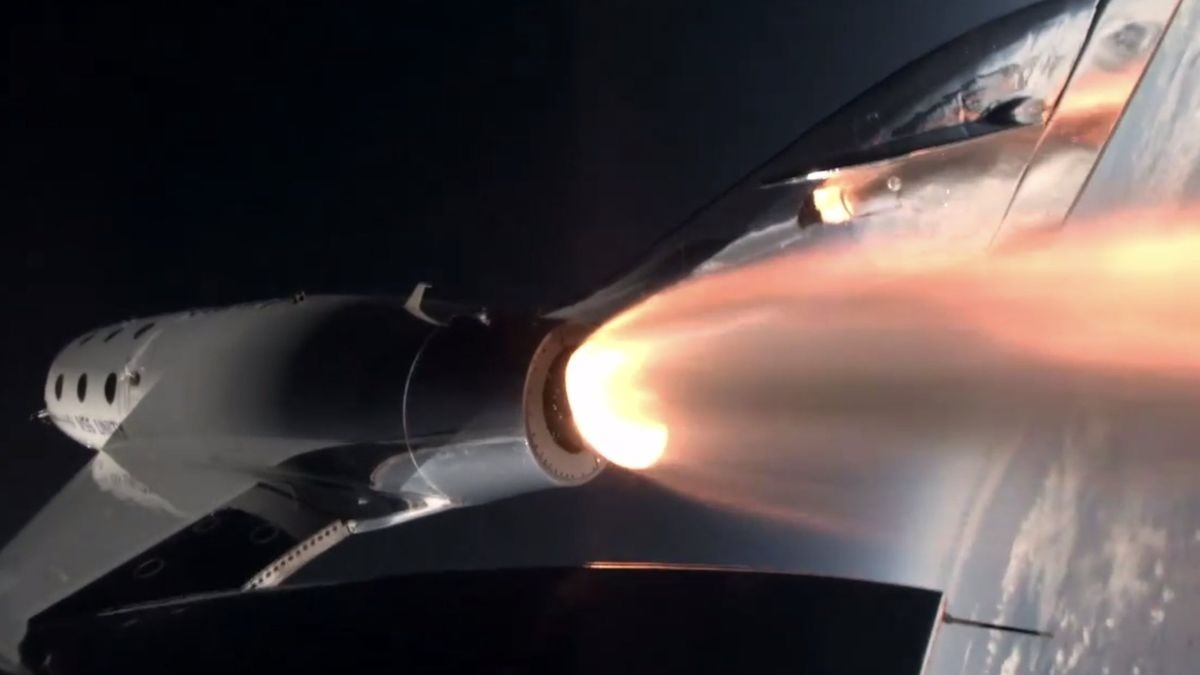
Virgin Galactic's VSS Unity space plane lights its rocket motor during the Galactic 06 suborbital mission, which launched on Jan. 26, 2024. (Image credit: Virgin Galactic)
As that post noted, Galactic 06 flew from Spaceport America, in southwestern New Mexico. Virgin Galactic's carrier aircraft, VMS Eve, lifted off from the site around noon EST (1700 GMT; 10 a.m. local time), with the four-passenger space plane VSS Unity under its wings.
Eve dropped Unity at an altitude of about 45,000 feet (13,700 meters), at which point the space plane ignited its rocket motor and headed up to suborbital space.
Galactic 06's passengers experienced a few minutes of weightlessness and got to see their home planet against the blackness of space before coming down to Earth for a runway landing at Spaceport America about 90 minutes after liftoff. (Virgin Galactic did not livestream the mission; it posted updates on X during the flight.)
Virgin Galactic didn't reveal the passengers' identities in the leadup to Galactic 06, giving only their home nations and/or states. One is from Texas, one is from California, one is an Austrian and the other hails from Nevada and Ukraine, the company said.
We got their names today: Lina Borozdina, Franz Haider, Neil Kornswiet and Robie Vaughn. Borozdina became the first Ukrainian woman to reach space, according to Virgin Galactic.
Commander C.J. Sturckow and pilot Nicola Pecile flew VSS Unity today, and Michael Masucci and Dan Alix were at the controls of VMS Eve.
Galactic 06 was Virgin's first mission of the year, and one of the final flights for Unity, if all goes according to plan. The company has said that it will soon retire the space plane, which has conducted all Virgin spaceflights to date, to focus on its forthcoming "Delta class" vehicle.
Each Delta plane will be able to fly up to twice per week, according to Virgin representatives. The first Delta vehicle is on track to start test flights in 2025, and the company wants it to begin commercial operations the following year.
Virgin Galactic has a competitor in the suborbital space tourism industry — Blue Origin, Jeff Bezos' aerospace company, which takes people and payloads aloft with a rocket-capsule combo called New Shepard.
New Shepard recently returned to flight after suffering a failure during an uncrewed research mission in September 2022. The vehicle hasn't carried people since August 2022.
Tickets to ride the six-passenger Unity currently cost $450,000. Blue Origin hasn't revealed its ticket prices.
Quelle: SCVirgin Galactic launches four private astronauts as it prepares to end Unity flights
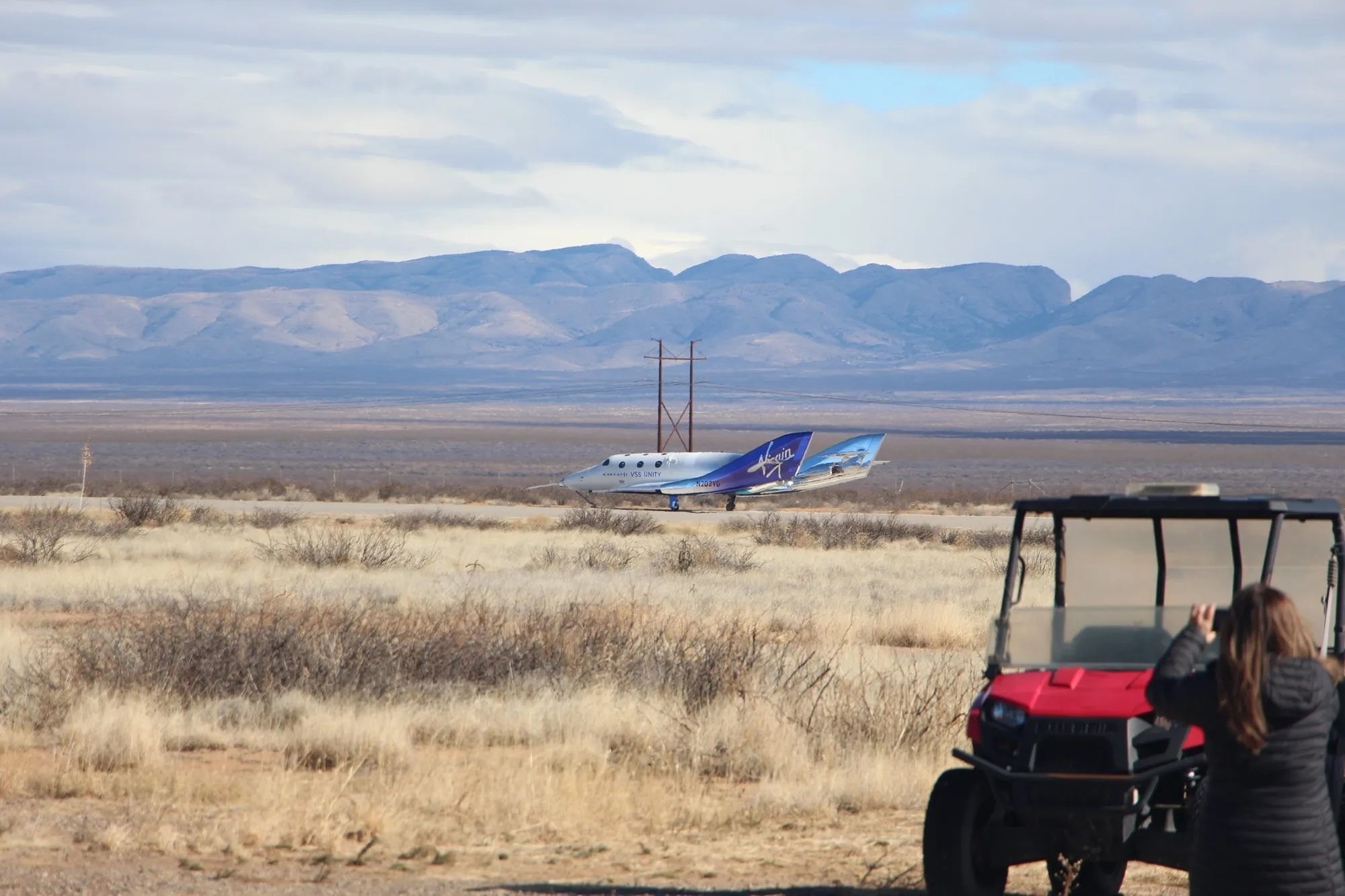
Virgin Galactic’s VSS unity suborbital spaceplane lands at Spaceport America at the conclusion of the Galactic 06 flight Jan 26. Credit: Spaceport America
WASHINGTON — Virgin Galactic conducted its first suborbital mission of 2024 on Jan. 26 as the company prepares end flights of its current spaceplane.
The VSS Unity spaceplane, attached the VMS Eve mothership aircraft, took off from Spaceport America in New Mexico at 12 p.m. Eastern. Unity separated about 45 minutes later, igniting its hybrid rocket engine. The vehicle reached a peak altitude of 88.8 kilometers before gliding back to a runway landing at the spaceport at 12:56 p.m. Eastern, according to data provided by the company
The flight, called Galactic 06 by Virgin Galactic, carried four customers for the first time, along with its two pilots. Previous commercial flights had three customers on board along with a Virgin Galactic astronaut trainer.
As with some recent flights, Virgin Galactic disclosed the identities of the four private astronauts only after the end of the mission. They are Americans Neil Kornswiet and Robie Vaughn, Ukrainian-American Lina Borozdina and Austrian Franz Haider. Unity was commanded by C.J. Sturckow with Nicola Pecile as pilot.
Virgin Galactic also did not provide a webcast of the launch, as on some previous flights, instead providing updates on social media. Those updates significantly lagged behind the timing of flight activities: the post on X (formerly Twitter) announcing the landing of Unity at the conclusion was published more than 35 minutes after landing.
“The success of Galactic 06 and the company’s other commercial spaceflights in recent months only increases our confidence in the repeatability of our product and our ability to deliver a superlative experience to our customers,” Michael Colglazier, chief executive of Virgin Galactic, said in a statement.
The flight was the first since a dedicated research flight, Galactic 05, Nov. 2. That flight was the sixth in less than six months for the vehicle, but Virgin Galactic said it would pause flights until January for an annual maintenance period.
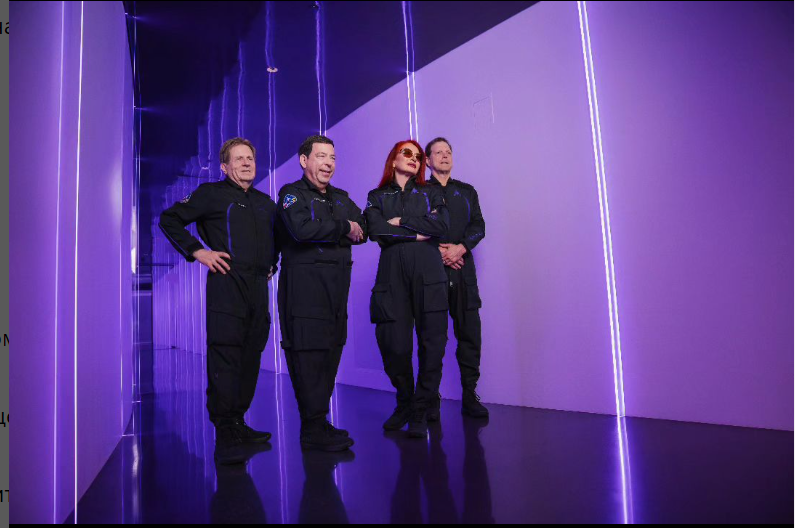
This was the company's first flight in 2024. In total, Virgin Galactic has already transported 32 space tourists.
Just a week after Galactic 05, though, Virgin Galactic announced it would soon wind down flights of VSS Unity, citing the need to conserve its cash reserves for development of its next-generation Delta class of suborbital vehicles. Those future vehicles are intended to fly more frequently and at lower costs than Unity.
Virgin Galactic said then that, after Galactic 06, it would fly Unity again on Galactic 07 in the second quarter of the year and, perhaps, a Galactic 08 mission in mid-2024. The company then plans to retire VSS Unity and shift resources into Delta-class vehicle development.
“With the production of our next-generation Delta-class ships underway, we look forward to expanding our flight capacity with testing expected to start next year and commercial service in 2026,” Colglazier said in the statement.
The company confirmed in the statement that Galactic 07 will take place in the second quarter and fly a researcher along with private astronauts. It did not provide other details about the flight.
Quelle: SN
